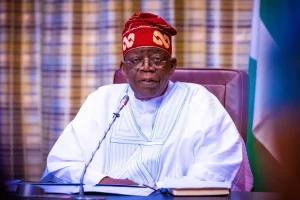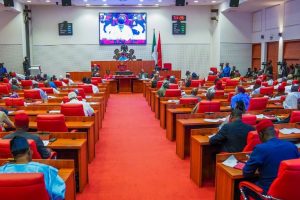In this report, LEKE BAIYEWU highlights some of the factors that made Tajudeen Abbas and Benjamin Kalu to have a smooth ride into the offices of the Speaker and the Deputy Speaker of the 10th House of Representatives, respectively
The 10th National Assembly was inaugurated on Tuesday and presiding officers of the Senate and the House of Representatives were elected during the exercise. The anointed candidates of the All Progressives Congress emerged winners despite stiff opposition to their endorsement by some members of both the governing party and opposition Peoples Democratic Party.
The National Working Committee of the APC had on May 8, 2023, released the zoning formula for the leadership of the 10th National Assembly, picking Godswill Akpabio (Akwa-Ibom/South-South) President of the Senate; Jibrin Barau (Kano/North-West) for Deputy President of the Senate; Tajudeen Abbas (Kaduna/North-West) for Speaker; and Benjamin Kalu (Abia/South-East) for Deputy Speaker.
Several aspirants for leadership positions in the Senate and the House had kicked against the APC leadership zoning plan, vowing to go ahead and contest against the party’s choice candidates.
The APC candidates and the aspirants aggrieved with the zoning plan of the party had banked on the votes of the newly elected members who are more than the returning members and members-elect in the opposition parties who collectively have more numbers that the ruling party. Nevertheless, Akpabio and Barau won in the Senate while Abbas and Kalu emerged as the presiding officers in the House.
However, the elections in the Senate and the House took different patterns. While an open-secret ballot was adopted in the Senate, it was an open voting in the House, which is one of the major factors many observers of the process have credited for APC’s victory against opponents in the House.
Long before the inauguration, several members-elect, especially freshers, expressed their reservations about open voting, especially at a time when there were more aspirants in the race. There were fears that those who wish to vote for aspirants outside the choice of their party and political godfathers might run into trouble. Some of the aspirants with deep pockets had also dangled carrots before the ‘electorate’ in the chamber, a situation that tested the loyalty of members-elect.
The atmosphere was rife with apprehension, so much that an online news medium, in a report that was deleted the same day, claimed there was a back-door amendment of the Standing Orders of the House, which contains rules guiding the conduct of legislative business in the chamber.
According to the report that was later dismissed by the House, it was alleged that the lawmakers had secretly amended the rules ahead of the inauguration of the 10th Assembly to restrict members ‘open ballot’ in the speakership and deputy speakership elections.
Indeed, Femi Gbajabiamila became Speaker of the 9th House on June 11, 2019. He also had another APC member, Umar Bago, who is now Governor of Niger State, running against his anointed candidacy. By July 25 of the same year, the House had amended its Standing Orders to have new provisions. This, many political pundits have described as strategic, especially as it came long before there would be any suspicion.
Chairman of the House Committee on Basic Education and Services, Prof Julius Ihonvbere, who chaired the panel that reviewed the rules book in 2019, however, dismissed the report.
Ihonvbere, in a statement released by the secretariat of the ‘Joint Task – 10th Assembly’, a coalition of members-elect of the APC and opposition parties, recalled how the House, on July 25, 2019, unanimously considered and adopted the report by his panel on a series of amendments to the Standing Orders of the House.
The lawmaker also denied interference by Gbajabiamila, in the process.
Ihonvbere, a member of the APC from Edo State, was the chairman of the Ad Hoc Committee on the Review of the Standing Orders of the House of Reps; ex-Chairman, Ad Hoc Committee on the Legislative Agenda of the House of Reps; and ex-Chairman, Ad Hoc Committee on the Revision of the Legislative Agenda of the House of Reps.
The lawmaker wrote, “For the records, anyone insinuating the House Rules was forged to allow open voting is either ignorant of what the members of the House of Representatives passed at plenary on Thursday, 25th July, 2019, or is mischievous or intend to manipulate the election process of the 10th House against the rule of law.”
Ihonvbere made reference to Page 32 of the Gazetted Votes and Proceedings of July 25, 2019, in the House’s Gazette of Votes and Proceedings Official Records. The lawmaker also provided a copy of the document showing how the lawmakers voted on the clauses.
The statement partly read, “The process was transparent and in line with our rules. Mr Speaker, Femi Gbajabiamila, did not interfere once in our deliberations. I never had even a one-on-one meeting with the Speaker throughout the process. The committee finalised its work and it was laid accordingly…The rest is history.
“It is not my wish to take up issues on the merit and demerits of the recommended and approved process. For now, let me state very categorically that the document was not tampered with in any way. As democrats, we must all refrain from trying to corrupt, contaminate or compromise the democratic process in any way.”
The amended Standing Orders of the House prescribes electronic voting or open voting where each member will “openly declare” who they are voting for. Fortunately for Abbas and unfortunately for his opponents, the ongoing renovation of the National Assembly Complex has led to the shutdown of the main chambers of the Senate and the House which have the gadgets for electronic voting.
Members of the ninth Assembly spent their last year sitting in ad hoc venues – conference rooms converted to chambers. Consequently, the ninth House was limited to the other option of open voting. Perhaps, the anti-Abbas forces would have hidden under the e-voting system to vote against the APC’s candidates anonymously.
A ranking member of the House, Bamidele Salam (PDP/Osun), had in an interview with our correspondent before the elections noted that opposition members who had the backing of their respective parties’ leadership had nothing to be afraid of.
Salam was one of the leaders of the pro-Abbas Minority Parties Forum, a coalition of members-elect in minority parties who broke out from the 10th Assembly – Greater Majority, the bigger minorities’ coalition.
He said, “We are leaders of the country and there is nothing to hide in one’s choice. If you are making a choice, even in our consideration of motions and bills, either electronically or otherwise, you indicate where you stand. So, when you want to elect the leaders of the National Assembly, what is wrong with coming out openly to declare where you stand? There is nothing wrong with that.”
Speaking on the fears of the freshers, Salam stated, “When they get into the House, they can change it. This is a democracy. When they are eventually inaugurated, they can bring a motion to change the House Rules. But for now, that is the rule. If anybody is not happy with it, then, they can wait till after the inauguration and it can be changed.”
Another ranking member of the House, Dagomie Abiante (PDP/Rivers), who spoke after the elections, expressed his support for the open voting, stating that there was no restriction in making lawmakers openly vote for their choice candidates.
He stated, “Who made the rules? Members-elect said ‘this is what suits us and this is what we want to do.’ I don’t think it is a restriction. If you are not man enough to stand before the world and say ‘after all the engagements, this is my preference;’ if you are not man enough, how can you stand before the world to discuss the issues that bother your constituents when you have people watching you? It is just a simple test to say ‘this is where I stand;’ to say ‘I have heard from everybody but this is my preferred candidate.’ It is as simple as that.”
When asked if the tradition of open voting should continue in the House, Abiante said, “Were you not happy with what you saw? It has produced the presiding officers of the House of Representatives. Is there anyone that you have seen here complaining? Nobody complained to me.”
On the possibility of a party asking its members to vote for a candidate that has a better opponent, the lawmaker said, “When you begin to talk about knowing within yourself that this candidate is not the best candidate, what are the parameters of the assessment? If you think you don’t have anything to do with your party and you don’t have to listen to them, run as an independent candidate.”
Another new development close watchers of events in the federal parliament observed was the sequence of the inauguration and elections.
Traditionally, the Clerk to the National Assembly, who conducts the inauguration ceremony and leadership election, usually starts with the Senate before the House. This time round, the ceremonies were conducted concurrently, with the deputy clerk presiding over the House.
There was a belief that there was never a time the choice candidates in the Senate won and those anointed in the House lost.
According to analysts, should Yari have defeated Akpabio in the Senate, the news would filter into the House and would have given rebels some hope of voting against Abbas.
The favourable factors allowed Abbas and Kalu to ride on the votes of opposition members whose numbers are more than the ruling parties in the chamber.
An analysis of the votes secured by Abbas and his two opponents – the immediate past Deputy Speaker, Ahmed Wase, and Sani Jaji – showed that all the members of the seven opposition parties that form the minority caucus in the 10th House voted for the APC’s preferred candidate.
The seven minority parties are the Peoples Democratic Party, Labour Party, New Nigeria Peoples Party, All Progressives Grand Alliance, Social Democratic Party, African Democratic Congress and the Youth Progressive Party.
There are 360 seats in the House, while 359 members voted in the speakership election, out of which Abbas secured 353 votes. Wase and Jaji got three votes each, including their own votes and those of the members who nominated them and those who seconded their nominations.
The PDP has 117 members; LP, 35; NNPP, 19; APGA, five; SDP, two; ADC, two; and the YPP, one, totalling 181 opposition members. APC on the other hand has 178 members.
Meanwhile, 359 members voted because there was a vacant seat, which was to be occupied by a PDP member-elect, Ismaila Maihanci, who died on April 22, 2023, about two months after winning the election for the seat of Jalingo/Yorro/Zing Federal Constituency in Taraba State. he death was less than two months to the inauguration of the 10th Assembly.
Disclaimer: No copyright infringement intended. All rights and credits reserved to respective owner(s).























Add Comment